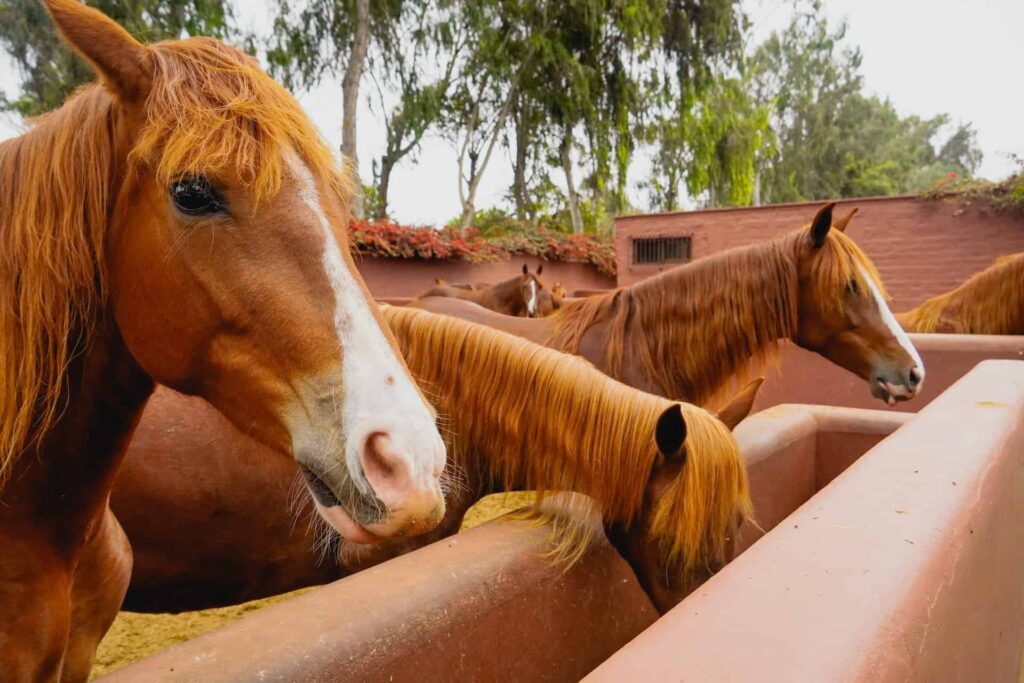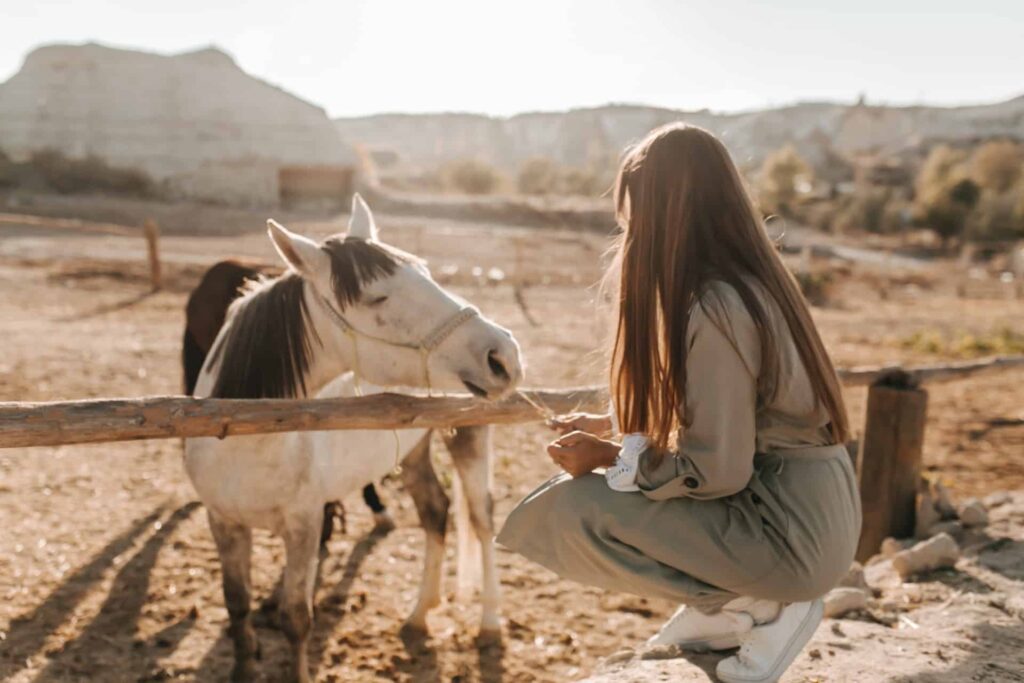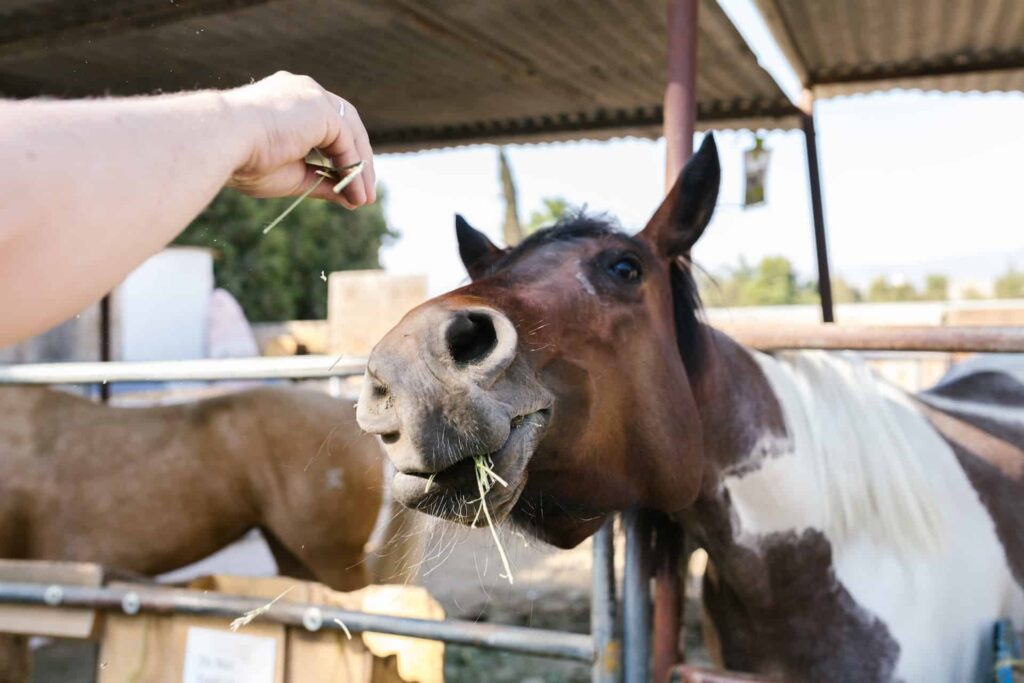The question of whether horses eat meat is an intriguing one that has generated interest and curiosity among many. Horses, being large and powerful creatures, often compel people to wonder if they derive their strength from consuming meat as well. However, it’s important to remember that the dietary nature of these animals is primarily that of herbivores, which means they are primarily plant-eaters.
Horses have evolved to feed on a diet consisting mostly of plant matter, such as grass and hay. Their digestive system is designed to handle a high-fiber diet comprised of these plant-based sources. However, there have been some exceptions to this rule, with documented instances of horses consuming meat or fish as additional protein sources on rare occasions.
Key Takeaways
- Horses are mainly herbivores, consuming a primarily plant-based diet
- Their digestive system is adapted to process high-fiber plant matter effectively
- Some exceptions exist, where horses have been known to consume meat or fish in certain situations
Dietary Nature of Horses
Basic Horse Diet
Horses primarily consume a diet consisting of grass, hay, and grains. These plant-based materials provide them with essential nutrients such as fiber, protein, and vitamins. Their teeth are designed for grinding plants, making it easier for them to break down and digest plant material. Hay is often fed to domestic horses as a staple food, while wild horses graze on a variety of grasses to obtain vital nutrients.
Herbivores by Nature
Horses are herbivores, which means their digestive systems are specifically evolved to process plant-based materials. Their stomachs and intestines contain various enzymes and bacteria that aid in breaking down fibers and extracting essential nutrients from plants.
Their teeth also play a critical role in their herbivorous nature. Horses possess a unique set of teeth that are specialized for grazing and grinding plant material. They have wide, flat molars for grinding and sharp premolars for cutting through fibrous plant material. This allows horses to effectively chew and break down plants, preparing them for digestion.
While horses have shown interest in the smell of human food, including meat, their digestive systems are not equipped to handle meat consumption. They lack the fangs or sharp teeth necessary for tearing meat, as well as the appropriate enzymes and stomach acidity needed for meat digestion.
Though there may be rare instances where horses consume animal products, it is important to emphasize that their natural diet is plant-based, and they should not be fed meat or other animal products. Their herbivorous nature is best supported by a balanced diet of grass, hay, and grains, ensuring their health and wellness.
The Horse’s Digestive System
Molars and Premolars
The horse’s digestive system is an efficient machine for processing plant-based materials. One of the essential parts of this system is the horse’s teeth. Horses have molars and premolars that are designed for grinding and chewing plant materials. These teeth help break down fibrous plant materials into smaller particles, making it easier for the rest of the digestive system to process.
Horses also have a unique dental structure that allows continuous wearing and regrowth of their teeth. This feature enables horses to maintain proper dental health as they chew and grind their fibrous diet throughout their lifetime.
The Stomach and Intestines
After the horse chews and grinds the plant material, the food moves through the rest of the digestive system. The stomach of a horse is relatively small compared to its body size, but it plays a critical role in breaking down food with the help of gastric acid and enzymes. The small size of the stomach necessitates that horses eat relatively small meals throughout the day rather than consuming one large meal.
Once the food leaves the stomach, it enters the small intestine, where the majority of nutrient absorption takes place. The small intestine breaks down proteins, starches, and fats, allowing the horse’s body to absorb these vital nutrients.
Following the small intestine, the food passes into the large intestine, which is comprised of the cecum, large colon, small colon, and rectum. In the large intestine, fermentation of the fibrous plant materials occurs with the help of bacteria. This process allows the horse to extract necessary energy and nutrients, such as volatile fatty acids and certain vitamins, from the plant matter. The large intestine has a significant storage capacity, enabling horses to effectively process their high-fiber diet over an extended period of time.
While the horse’s digestive system is capable of breaking down plant materials, it is not well-suited for processing meat. The physiology and structure of their teeth, stomach, and intestines are designed specifically for a herbivorous diet. Although there are few instances where horses have consumed meat, it is not a natural part of their diet and can lead to digestive issues if ingested.
Exceptions to the Plant-Based Diet
Situation in Iceland
In Iceland, unique circumstances have led to instances of horses consuming protein-rich meat. Due to the harsh environment and limited availability of vegetation during winter months, Icelandic horses are sometimes fed dried fish as a supplementary protein source. While it is not a common practice, these horses can digest the dried fish without adverse effects, showcasing adaptability in their diet. It is crucial to emphasize that this situation is not the norm and does not negate horses’ classification as herbivores.
Case of Pica
Pica is a medical condition that affects various animals, including horses, in which they consume non-nutritive or non-food items. Affected horses may incidentally ingest bones or small amounts of meat while searching for nutrients to satisfy their cravings. This ingestion of meat is not due to a natural carnivorous tendency but rather a symptom of the disorder. Pica may develop in horses due to mineral deficiencies, imbalances in their diet, or other underlying health issues. In such cases, it is essential to address the root cause to prevent further complications.
It is important to understand that these exceptional cases do not make horses carnivores or even omnivores. Their digestive systems are still primarily designed for processing plant matter, making them herbivores by nature. Instances like those in Iceland or involving Pica are rare and should not be regarded as typical of a horse’s diet.
Health Risks of Feeding Meat to Horses
Colic
Feeding meat to horses can increase the risk of colic, a severe abdominal pain caused by gas or obstruction in the gastrointestinal tract. Horses have a specialized digestive system designed to process plant-based diets, which includes a large cecum and colon that aid in breaking down fibrous plant material. Introducing meat into their diet disrupts this natural process, resulting in an increased risk of colic.
Potential Toxins
In addition to causing colic, feeding meat to horses exposes them to potential toxins. Meat can contain harmful bacteria, such as Clostridium botulinum, which may lead to botulism, a life-threatening disease affecting the nervous system. Moreover, horses cannot vomit, which means that ingesting toxins or harmful substances cannot be easily expelled from their bodies.
Another concern is that meat may contain traces of medications or other substances that are not safe for equine consumption. These can accumulate in the horse’s body and cause adverse reactions or long-term health issues.
To maintain optimal health and well-being, it is crucial to provide horses with a balanced, plant-based diet, as their bodies are not equipped to process meat efficiently. Avoiding meat in their diet reduces the risk of colic and exposure to potential toxins, ensuring a healthy and happy life for these magnificent animals.
Nutritional Requirements of Horses
Essential Nutrients
Horses require a balanced diet consisting of various nutrients to maintain their health. Their primary source of energy comes from carbohydrates, specifically fiber, which is found in forage such as hay and grass. Besides carbohydrates, horses need proteins for muscle development and maintaining their blood. Essential minerals like calcium and sodium support bone health and nerve function, while iron carries oxygen within the blood. Fat-soluble vitamins such as A, D, E, and K play vital roles in the horse’s dietary needs, providing antioxidants and contributing to the immune system.
Water is a crucial component of a horse’s diet, as it helps regulate body temperature, eliminates waste, and transports nutrients throughout the body. Providing clean and fresh water is vital for maintaining their hydration and overall health.
Supplements
Though forage should be the basis of a horse’s diet, it may not always provide all the necessary nutrients. In such cases, supplements can be added to fill any nutritional gaps. Specific needs may vary depending on the individual horse, their age, workload, and health status. It is essential to carefully consider nutrient deficiencies to avoid over- or under-supplementation and consult an equine nutrition expert or veterinarian for guidance.
Common supplements can include additional minerals, vitamins, or energy sources like fat. For example, horses with low iron levels may benefit from iron supplementation; however, it should be noted that excessive iron can be harmful, so supplementation should only be used when necessary. Likewise, sodium and calcium can be added to the diet to help prevent electrolyte imbalances and support healthy bones.
A balanced diet consisting of carbohydrates, proteins, minerals, vitamins, fats, and water is essential for a horse’s health. Forage should be the foundation of their nutrition, and supplements can be used to address any deficiencies, tailored specifically to their individual needs. Always seek professional advice before introducing supplements to ensure optimal health and well-being for your horse.
What Horses Prefer to Eat
Preference for Hay and Grass
Horses are herbivores, which means they primarily consume plant-based materials. Their digestive systems have evolved to accommodate a high-fiber diet consisting of grass and other plants. Grass and hay make up the majority of a horse’s diet, providing the necessary roughage and nutrients for optimal health and vitality.
Grasses are the natural food source for horses, as their grazing patterns allow them to consume small amounts of grass continuously throughout the day. Hay serves as a substitute for grass, especially during the winter months when fresh pasture is less available. Hay can come in various forms, such as alfalfa, timothy, and mixed grasses, each contributing to the horse’s diet in a specific way.
Fruits, Vegetables, and Treats
Beyond their primary diet of grasses and hay, horses can also enjoy certain fruits and vegetables that supplement their nutrition. Some common favorites among horses include carrots, apples, and pears. Other vegetables, such as celery, cucumber, and green beans, can also be safe options for horses to eat. These fruits and vegetables not only offer additional nutrients, but also provide a variety of flavors for horses to enjoy.
Horse owners can also give their animals occasional treats as a reward for good behavior or to strengthen the bond between horse and owner. These treats can come in the form of special horse cookies or small pieces of fruits and vegetables. It is essential to be mindful of the amount and frequency of treats, as too many can lead to health issues and disrupt the horse’s balanced diet.
While horses are primarily vegetarian, it is worth noting that they are not carnivores like other animals, and their diet should consist primarily of plant-based materials. By providing a diet rich in grasses, hay, and selected fruits and vegetables, horse owners can ensure their animals receive the proper nutrition for a healthy and active lifestyle.
Horses and Human Food
Dangers of Human Food
Horses are herbivores, meaning they primarily consume plants and hay, and their digestive systems have evolved to accommodate a high-fiber diet. Feeding horses human food, especially meat can be dangerous for their health. Their lack of necessary enzymes makes it difficult for them to properly digest meat, which can lead to potential health issues. Additionally, some foods that humans enjoy, like chocolate or onions, can be toxic to horses and should be avoided.
It is essential to keep in mind that horses have a keen sense of smell and taste. While they may be curious about the smell of some human foods, feeding them items not suited to their diet is not recommended. Moreover, human foods could contain harmful chemicals, colorants, or preservatives that could negatively affect a horse’s digestion and overall health.
Safe Human Foods
Even though horses should primarily consume their natural diet of grasses, hay, and grains, some human foods are safe when offered as an occasional treat. A few examples of human foods that can be fed to horses in moderation include:
- Fruits: apples, bananas, watermelon, and berries
- Vegetables: carrots, celery, and sweet potato
- Natural sweeteners: honey
It’s important not to rely on human foods as a primary food source for horses, but they may be enjoyed as occasional treats in small quantities. It is always best to consult your veterinarian or equine nutrition expert before adding any new items to your horse’s diet.
Do Horses Eat Meat – Final Thoughts
Horses are primarily herbivores, which means their natural diet consists of plants such as grasses, hay, and grains. Their digestive systems are designed for processing plant materials, and they are not equipped to handle meat consumption. While there have been isolated instances of horses consuming animal products, these situations are not the norm.
Feeding horses meat or introducing it into their diet can negatively impact their health. As herbivores, horses have a long digestive tract and a relatively small stomach, making them ill-equipped to process meat. It is important for horse owners to provide a proper diet of plant-based materials to ensure their horses maintain optimal health and vitality.
In conclusion, horses should not be fed meat as their digestive systems are designed for herbivorous diets. Providing a plant-based diet that includes appropriate amounts of hay, grains, and pasture access will promote overall horse health and well-being, allowing these magnificent animals to thrive.
RELATED: Horse Nutrition
Frequently Asked Questions
What is the natural diet of horses?
Horses are herbivores, and their natural diet consists primarily of hay, grasses, and grains. They have evolved to digest large amounts of fiber from plants, which provides them with the energy they need for daily activities. Horses may also consume other plant-based foods, depending on their environment and availability.
Are horses herbivores or omnivores?
Horses are herbivores, not omnivores. Their digestive system is specifically designed to process plant material, and they lack the physical adaptations needed to consume and digest meat efficiently.
Can horses eat fish?
Although horses can technically consume fish, it is not a natural part of their diet, and feeding fish to horses is not recommended. Horses’ digestive systems are not equipped to efficiently process animal proteins, and it may cause digestive discomfort or other health issues.
Do horses ever consume rats?
While it is rare, there have been instances of horses accidentally consuming small mammals such as rats when they eat their regular feed, which may have these animals in it inadvertently. However, this is not a common occurrence, and horses do not actively seek out or hunt for rats.
Were there ever carnivorous horses in history?
There is no scientific evidence to support the existence of carnivorous horses in history. Horses have always been herbivores, primarily consuming plant-based materials. Any anecdotal stories of horses consuming meat are likely the result of unusual circumstances or misunderstandings.
Will horses eat meat when facing starvation?
It is unlikely that horses would choose to eat meat when facing starvation, as their digestive systems are not designed to process it efficiently. However, in extreme cases, a horse may consume meat out of desperation, but this would be an exceptional and rare event. Horses would usually continue to search for plant-based food sources even in dire circumstances.
Last Updated on September 24, 2023 by Nate Dewsbury



